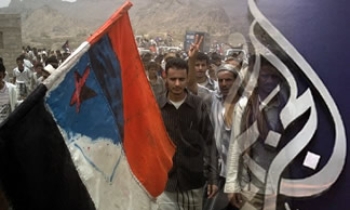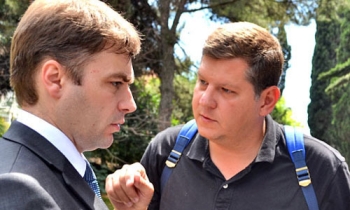BAGHDAD, March 30 -- American journalist Jill Carroll, abducted at gunpoint in January, was released Thursday after nearly three months of intensive efforts to free her and public pleas on her behalf from a worldwide chorus of relatives, politicians and religious leaders.
"I was treated very well. That's important people know that," Carroll said in an interview broadcast on the TV station run by the Iraqi Islamic Party, a Sunni Arab organization. "They never said they would hit me, never threatened me in any way. I was just happy to be free, and I want be with my family."
Carroll, 28, a freelance writer who had been working for the Christian Science Monitor, was delivered Thursday morning to a party office in the west Baghdad neighborhood of Amiriyah. She had been kidnapped in Baghdad on Jan. 7 when gunmen ambushed her car, killing her Iraqi interpreter, Allan Enwiyah, 32. Her driver escaped unharmed.
A statement from Carroll's family, posted on the Monitor's Web site Thursday, said: "Our hearts are full. We are elated by Jill's safe release." It also offered prayers for those still held hostage in Iraq.
President Bush, whose spokesman had called Carroll's safe return an administration priority, said in Cancun, Mexico, "I'm really grateful she was released and thank those who worked hard for her release, and we're glad she's alive."
Carroll's release came one week after three members of the Chicago-based advocacy group Christian Peacemaker Teams, taken hostage in November, were rescued by American and British soldiers. Another group member who had been abducted with them, Tom Fox of Clear Brook, Va., was found shot to death March 9.
More than 425 foreigners, and several times that many Iraqis, have been taken hostage since the U.S.-led invasion in 2003, according to U.S. officials who track abductions. The number of Western journalists, contractors and aid workers kidnapped in Iraq has surged since late last year after a lull of several months.
Throughout Carroll's 82-day ordeal, her parents and twin sister, Katie, and supporters throughout the United States, Europe and the Middle East campaigned for her release by appearing on English- and Arabic-language television networks and placing advertisements in Iraqi and regional media.
The blitz, which included a large rally in the streets of Paris and a giant photo of her face hung on City Hall in Rome, stressed that Carroll, an Arabic speaker who had lived in the Middle East for more than three years, appreciated and admired Iraqi culture and had traveled to the war-torn country to report on the plight of its people.
In an article she wrote last year for the American Journalism Review, Carroll said she had moved to Jordan months before the U.S. invasion of Iraq "to learn as much about the region as possible before the fighting began."
In a late-morning interview with reporters in his yard in Chapel Hill, N.C., broadcast by CNN, Jim Carroll said he had spoken with his daughter at 6 a.m. and learned that she was in "good health" and "mentally strong."
"It was a fantastic conversation," he said. "It's been a long haul."
Just after noon Thursday, Tariq al-Hashimi, secretary general of the Iraqi Islamic Party, called The Washington Post's Baghdad bureau to say that Carroll had been released by "unknown people."
"I have sent armored cars to bring her to the [party] headquarters," he said. "She requested me to talk to you and inform you directly and will be here within half an hour. Will you come here? She is okay. She is safe. She is more or less scared. I told her to calm down and we would take care of her."
Upon her arrival at party headquarters about 1 p.m., party officials asked Carroll, clad in a gray-and-blue scarf and traditional robe, to sit for an interview that they said would be solely for their records.
The interview was broadcast about two hours later on Baghdad TV, the party's satellite station. Carroll said she did not know where she had been held captive nor why her kidnappers decided to release her.
"I don't know what happened," she said in the interview, which was rebroadcast around the world. "They just came to me and said, 'Okay, we're letting you go now.' "
She declined to describe her captivity in detail but said she had been fed well and had access to showers. She said that she rarely received news from the outside world and that the lack of freedom and the uncertainty were hard to bear.
"It was difficult, because I didn't -- I didn't know what would happen to me," she said.
After leaving the party office, Carroll met with U.S. Ambassador Zalmay Khalilzad, who in a news conference Thursday afternoon thanked the Iraqi Islamic Party and all Iraqi politicians who had lobbied for her release. The United States did not make any agreement with Carroll's captors or pay any ransom, he said.
In a statement on its Web site, the Monitor said neither the paper nor Carroll's family had negotiated her release or paid a ransom.
"Furthermore, we have no information that would lead us to believe that any other party negotiated Jill's release or paid a ransom," the statement said.
David Cook, the Washington bureau chief for the Monitor, said he learned of Carroll's release when Jim Carroll called his cellphone at 6:10 a.m.
"Frankly, when I saw it, I thought, 'Oh, some reporter must be bothering Jim.' Because I'm the one who's supposed to chase the reporters away," Cook said later. "And then he told me what was happening, and it was wonderful. It was just stunning."
The identity of Carroll's captors was never fully clear. She appeared in three videos delivered to satellite television networks in the region. In one that aired in January, a little-known group calling itself the Vengeance Brigades threatened to kill Carroll within 72 hours unless all female prisoners held by U.S. forces in Iraq were released. Later that month, five female detainees were freed, a move U.S. military officials said was the result of a standard review of their cases.
Carroll was last seen Feb. 9, telling supporters in footage first broadcast on a Kuwaiti television station that time to win her release was running out. Her captors imposed a Feb. 26 deadline for their demands to be met.
In a final video released Thursday, Carroll was shown speaking positively about her captivity and the mujaheddin, Arabic for holy warriors, who she said were holding her.
Correspondent Ellen Knickmeyer and special correspondents Bassam Sebti and Naseer Nouri in Baghdad and staff writer Debbi Wilgoren in Washington contributed to this report.









